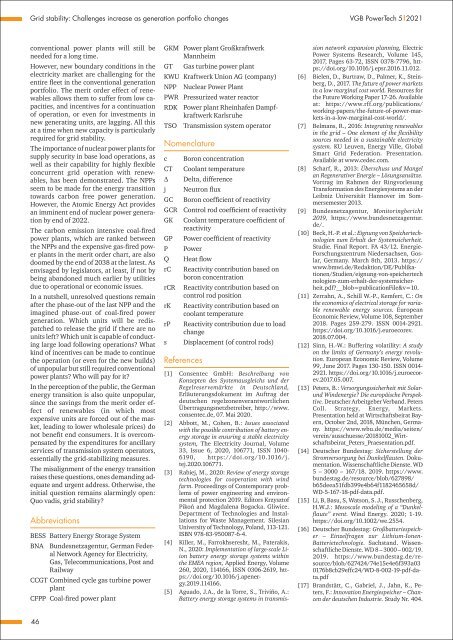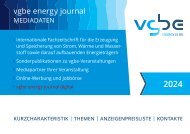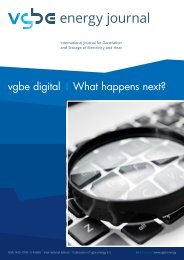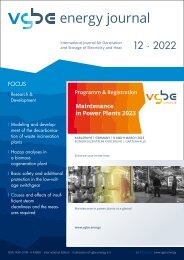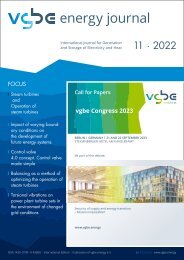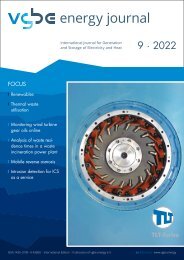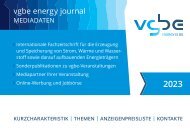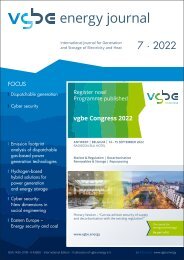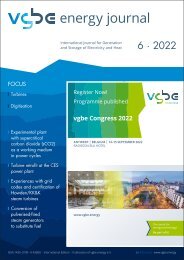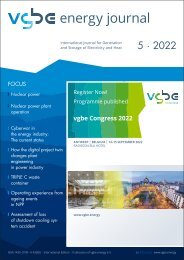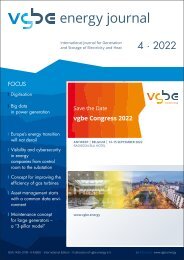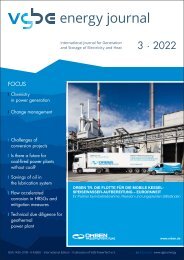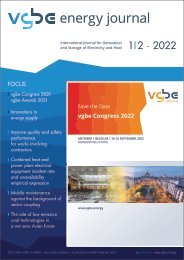VGB POWERTECH 5 (2021) - International Journal for Generation and Storage of Electricity and Heat
VGB PowerTech - International Journal for Generation and Storage of Electricity and Heat. Issue 5 (2021). Technical Journal of the VGB PowerTech Association. Energy is us! Nuclear power. Nuclear power plants - operation and operation experiences
VGB PowerTech - International Journal for Generation and Storage of Electricity and Heat. Issue 5 (2021).
Technical Journal of the VGB PowerTech Association. Energy is us!
Nuclear power. Nuclear power plants - operation and operation experiences
You also want an ePaper? Increase the reach of your titles
YUMPU automatically turns print PDFs into web optimized ePapers that Google loves.
Grid stability: Challenges increase as generation portfolio changes <strong>VGB</strong> PowerTech 5 l <strong>2021</strong><br />
conventional power plants will still be<br />
needed <strong>for</strong> a long time.<br />
However, new boundary conditions in the<br />
electricity market are challenging <strong>for</strong> the<br />
entire fleet in the conventional generation<br />
portfolio. The merit order effect <strong>of</strong> renewables<br />
allows them to suffer from low capacities,<br />
<strong>and</strong> incentives <strong>for</strong> a continuation<br />
<strong>of</strong> operation, or even <strong>for</strong> investments in<br />
new generating units, are lagging. All this<br />
at a time when new capacity is particularly<br />
required <strong>for</strong> grid stability.<br />
The importance <strong>of</strong> nuclear power plants <strong>for</strong><br />
supply security in base load operations, as<br />
well as their capability <strong>for</strong> highly flexible<br />
concurrent grid operation with renewables,<br />
has been demonstrated. The NPPs<br />
seem to be made <strong>for</strong> the energy transition<br />
towards carbon free power generation.<br />
However, the Atomic Energy Act provides<br />
an imminent end <strong>of</strong> nuclear power generation<br />
by end <strong>of</strong> 2022.<br />
The carbon emission intensive coal-fired<br />
power plants, which are ranked between<br />
the NPPs <strong>and</strong> the expensive gas-fired power<br />
plants in the merit order chart, are also<br />
doomed by the end <strong>of</strong> 2038 at the latest. As<br />
envisaged by legislators, at least, if not by<br />
being ab<strong>and</strong>oned much earlier by utilities<br />
due to operational or economic issues.<br />
In a nutshell, unresolved questions remain<br />
after the phase-out <strong>of</strong> the last NPP <strong>and</strong> the<br />
imagined phase-out <strong>of</strong> coal-fired power<br />
generation. Which units will be redispatched<br />
to release the grid if there are no<br />
units left? Which unit is capable <strong>of</strong> conducting<br />
large load following operations? What<br />
kind <strong>of</strong> incentives can be made to continue<br />
the operation (or even <strong>for</strong> the new builds)<br />
<strong>of</strong> unpopular but still required conventional<br />
power plants? Who will pay <strong>for</strong> it?<br />
In the perception <strong>of</strong> the public, the German<br />
energy transition is also quite unpopular,<br />
since the savings from the merit order effect<br />
<strong>of</strong> renewables (in which most<br />
expensive units are <strong>for</strong>ced out <strong>of</strong> the market,<br />
leading to lower wholesale prices) do<br />
not benefit end consumers. It is overcompensated<br />
by the expenditures <strong>for</strong> ancillary<br />
services <strong>of</strong> transmission system operators,<br />
essentially the grid-stabilizing measures.<br />
The misalignment <strong>of</strong> the energy transition<br />
raises these questions, ones dem<strong>and</strong>ing adequate<br />
<strong>and</strong> urgent address. Otherwise, the<br />
initial question remains alarmingly open:<br />
Quo vadis, grid stability?<br />
Abbreviations<br />
BESS Battery Energy <strong>Storage</strong> System<br />
BNA Bundesnetzagentur, German Federal<br />
Network Agency <strong>for</strong> <strong>Electricity</strong>,<br />
Gas, Telecommunications, Post <strong>and</strong><br />
Railway<br />
CCGT Combined cycle gas turbine power<br />
plant<br />
CFPP Coal-fired power plant<br />
GKM Power plant Großkraftwerk<br />
Mannheim<br />
GT Gas turbine power plant<br />
KWU Kraftwerk Union AG (company)<br />
NPP Nuclear Power Plant<br />
PWR Pressurized water reactor<br />
RDK Power plant Rheinhafen Dampfkraftwerk<br />
Karlsruhe<br />
TSO Transmission system operator<br />
Nomenclature<br />
c Boron concentration<br />
CT Coolant temperature<br />
Δ Delta, difference<br />
j Neutron flux<br />
GC Boron coefficient <strong>of</strong> reactivity<br />
GCR Control rod coefficient <strong>of</strong> reactivity<br />
GK Coolant temperature coefficient <strong>of</strong><br />
reactivity<br />
GP Power coefficient <strong>of</strong> reactivity<br />
P Power<br />
Q <strong>Heat</strong> flow<br />
rC Reactivity contribution based on<br />
boron concentration<br />
rCR Reactivity contribution based on<br />
control rod position<br />
rK Reactivity contribution based on<br />
coolant temperature<br />
rP Reactivity contribution due to load<br />
change<br />
s Displacement (<strong>of</strong> control rods)<br />
References<br />
[1] Consentec GmbH: Beschreibung von<br />
Konzepten des System ausgleichs und der<br />
Regelreservemärkte in Deutschl<strong>and</strong>,<br />
Erläuterungsdokument im Auftrag der<br />
deutschen regel zonen verantwortlichen<br />
Übertragungsnetzbetreiber, http://www.<br />
consentec.de, 07. Mai 2020.<br />
[2] Abbott, M., Cohen, B.: Issues associated<br />
with the possible contribution <strong>of</strong> battery energy<br />
storage in ensuring a stable electricity<br />
system, The <strong>Electricity</strong> <strong>Journal</strong>, Volume<br />
33, Issue 6, 2020, 106771, ISSN 1040-<br />
6190, https://doi.org/10.1016/j.<br />
tej.2020.106771.<br />
[3] Rabiej, M., 2020: Review <strong>of</strong> energy storage<br />
technologies <strong>for</strong> cooperation with wind<br />
farm. Proceedings <strong>of</strong> Contemporary problems<br />
<strong>of</strong> power engineering <strong>and</strong> environmental<br />
pro tection 2019. Editors Krzyszt<strong>of</strong><br />
Pikoń <strong>and</strong> Magdalena Bogacka. Gliwice.<br />
Department <strong>of</strong> Technologies <strong>and</strong> Installations<br />
<strong>for</strong> Waste Management. Silesian<br />
University <strong>of</strong> Technology, Pol<strong>and</strong>, 113-121.<br />
ISBN 978-83-950087-6-4.<br />
[4] Killer, M., Farrokhseresht, M., Paterakis,<br />
N., 2020: Implementation <strong>of</strong> large-scale Liion<br />
battery energy storage systems within<br />
the EMEA region, Applied Energy, Volume<br />
260, 2020, 114166, ISSN 0306-2619, https://doi.org/10.1016/j.apenergy.2019.114166.<br />
[5] Aguado, J.A., de la Torre, S., Triviño, A.:<br />
Battery energy storage systems in transmission<br />
network expansion planning, Electric<br />
Power Systems Research, Volume 145,<br />
2017, Pages 63-72, ISSN 0378-7796, https://doi.org/10.1016/j.epsr.2016.11.012.<br />
[6] Bielen, D., Burtraw, D., Palmer, K., Steinberg,<br />
D., 2017. The future <strong>of</strong> power markets<br />
in a low marginal cost world. Resources <strong>for</strong><br />
the Future Working Paper 17-26. Available<br />
at: https://www.rff.org/publications/<br />
working-papers/the-future-<strong>of</strong>-power-markets-in-a-low-marginal-cost-world/.<br />
[7] Belmans, R., 2016: Integrating renewables<br />
in the grid – One element <strong>of</strong> the flexibility<br />
sources needed in a sustainable electricity<br />
system. KU Leuven, Energy Ville, Global<br />
Smart Grid Federation. Presentation.<br />
Available at www.cedec.com.<br />
[8] Scharf, R., 2013: Überschuss und Mangel<br />
an Regenerativer Energie – Lösungsansätze.<br />
Vortrag im Rahmen der Ring vorlesung<br />
Trans<strong>for</strong>mation des Energiesystems an der<br />
Leibniz Universität Hannover im Sommersemester<br />
2013.<br />
[9] Bundesnetzagentur, Monitoringbericht<br />
2019, https://www.bundesnetzagentur.<br />
de/.<br />
[10] Beck, H.-P. et al.: Eignung von Speichertechnologien<br />
zum Erhalt der Systemsicherheit.<br />
Studie. Final Report. FA 43/12. Energie-<br />
Forschungszentrum Niedersachsen, Goslar,<br />
Germany. March 8th, 2013. https://<br />
www.bmwi.de/Redaktion/DE/Publikationen/Studien/eignung-von-<br />
speichertech<br />
nologien-zum-erhalt-der-systemsicherheit.pdf?__blob=publicationFile&v=10.<br />
[11] Zerrahn, A., Schill W.-P., Kemfert, C.: On<br />
the economics <strong>of</strong> electrical storage <strong>for</strong> variable<br />
renew able energy sources. European<br />
Economic Review, Volume 108, September<br />
2018. Pages 259-279. ISSN 0014-2921.<br />
https://doi.org/10.1016/j.euroecorev.<br />
2018.07.004.<br />
[12] Sinn, H.-W.: Buffering volatility: A study<br />
on the limits <strong>of</strong> Germany’s energy revolution.<br />
European Economic Review, Volume<br />
99, June 2017. Pages 130-150. ISSN 0014-<br />
2921. https://doi.org/10.1016/j.euroecorev.2017.05.007.<br />
[13] Peters, B.: Versorgungssicherheit mit Solarund<br />
Wind energie? Die europäische Perspektive.<br />
Deutscher Arbeit geber Verb<strong>and</strong>. Peters<br />
Coll. Strategy, Energy, Markets.<br />
Presentation held at Wirtschaftsbeirat Bayern,<br />
October 2nd, 2018, München, Germany.<br />
https://www.wbu.de/media/seiten/<br />
verein/ausschuesse/20181002_Wirtschaftsbeirat_Peters_Praesentation.pdf.<br />
[14] Deutscher Bundestag: Sicherstellung der<br />
Stromversorgung bei Dunkelflauten. Dokumentation.<br />
Wissenschaftliche Dienste. WD<br />
5 – 3000 – 167/18. 2019. https://www.<br />
bundestag.de/resource/blob/627898/<br />
b65deea51fdb399e4b64f1182465658d/<br />
WD-5-167-18-pdf-data.pdf.<br />
[15] Li, B, Basu, S, Watson, S. J., Russchenberg,<br />
H.W.J.: Mesoscale modeling <strong>of</strong> a “Dunkelflaute”<br />
event. Wind Energy. 2020; 1-19.<br />
https://doi.org/10.1002/we.2554.<br />
[16] Deutscher Bundestag: Großbatteriespeicher<br />
– Einzelfragen zur Lithium-Ionen-<br />
Batterie technologie. Sachst<strong>and</strong>. Wissenschaftliche<br />
Dienste. WD 8 – 3000 – 002/19.<br />
2019. https://www.bundestag.de/resource/blob/627424/74e15e4e6f393a03<br />
0176b8cb29effc24/WD-8-002-19-pdf-data.pdf<br />
[17] Br<strong>and</strong>stätt, C., Gabriel, J., Jahn, K., Peters,<br />
F.: Innovation Energiespeicher – Chancen<br />
der deutschen Industrie. Study Nr. 404.<br />
46


